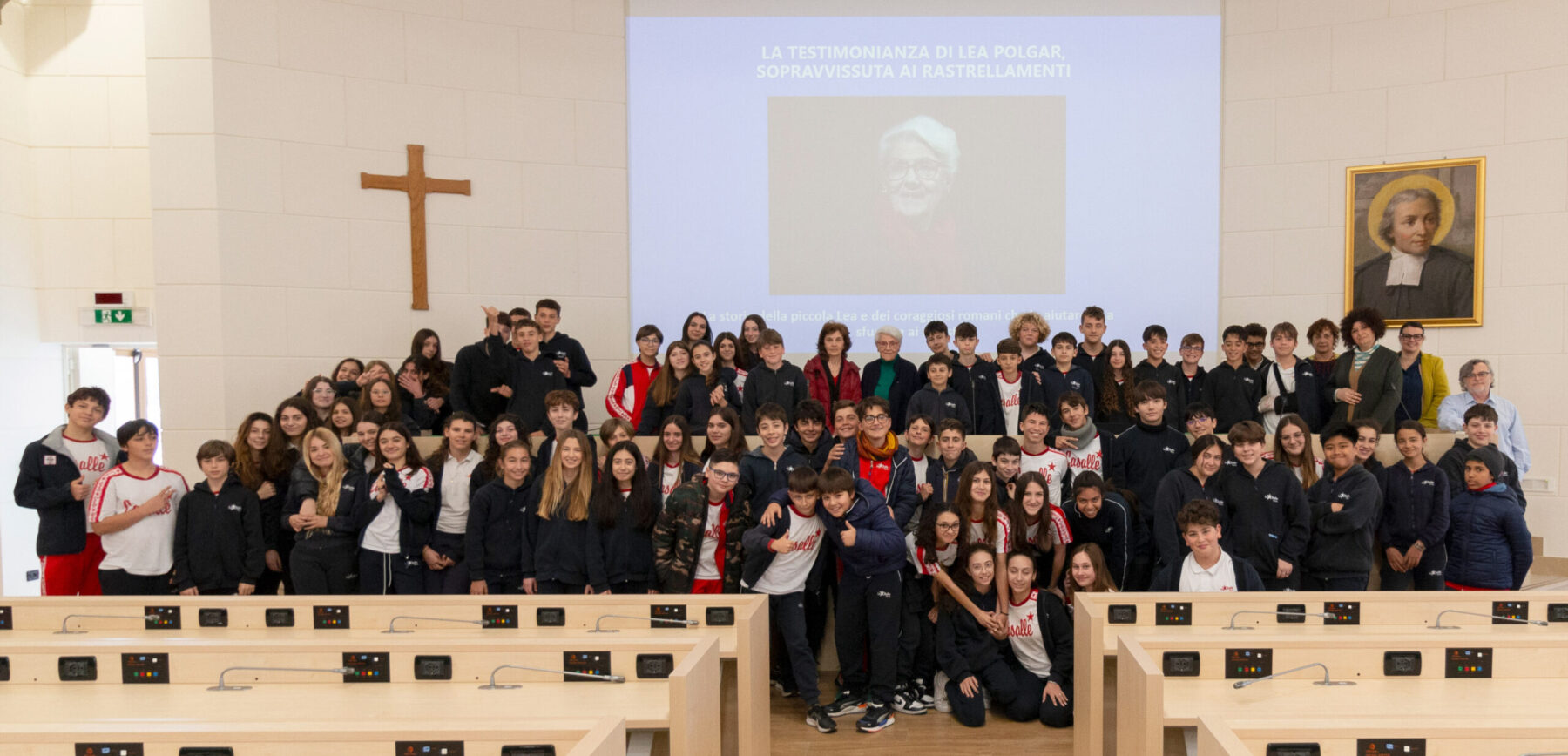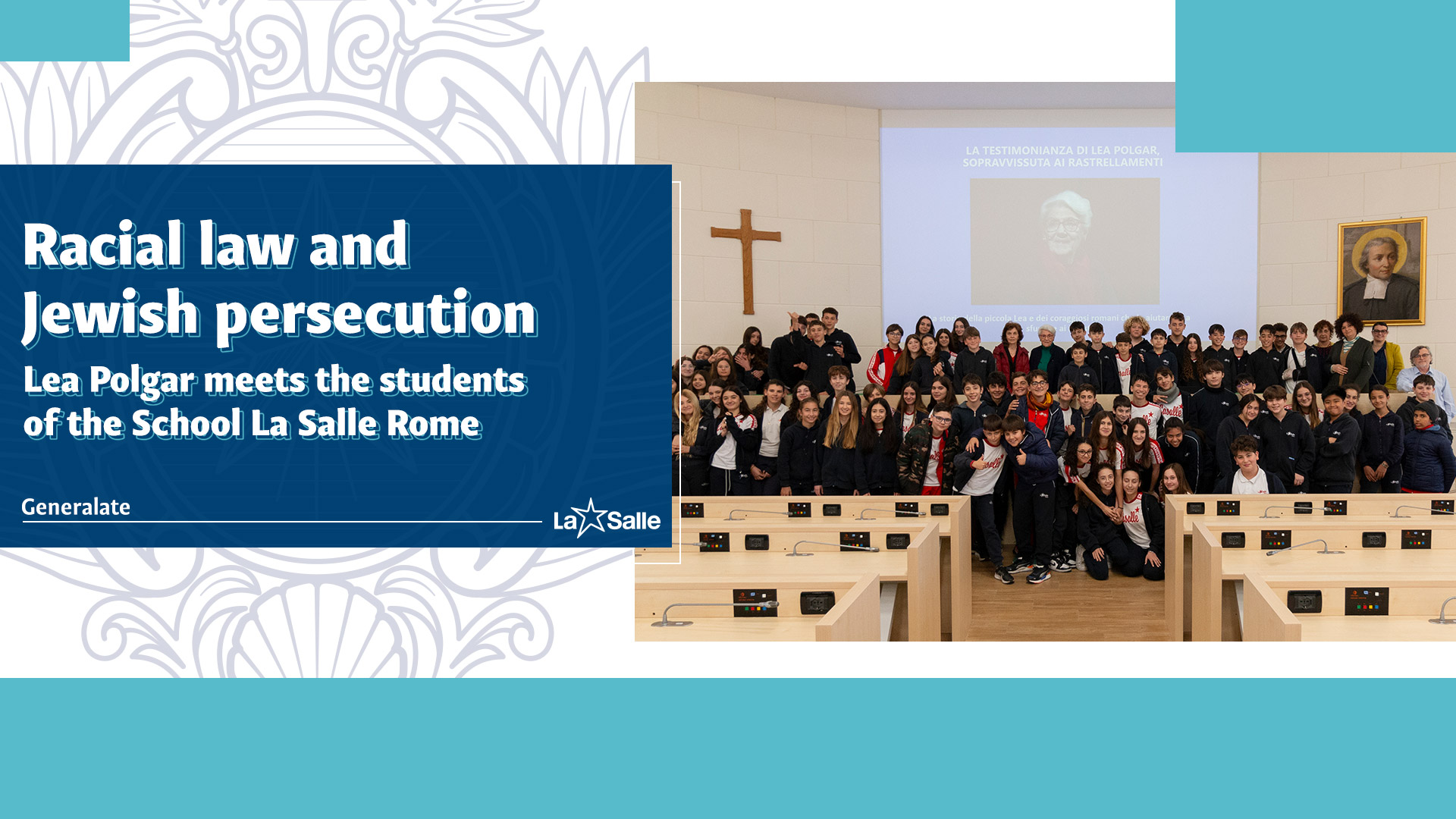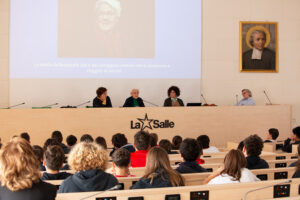 On 4 April 2024, at an Aula Magna full of students from the school ‘La Salle Roma’ (12-13 years old). the Generalate of the Brothers of the Christian Schools, welcomed Lea Polgar, a very active Jewish lady who dedicates her life to meeting young people and students to tell them about the incredible and shocking experience of the racial laws and the discrimination she suffered during the twenty years of Fascism in Italy and the Second World War, “Study to understand, learn and not be manipulated. Only in this way will you avoid the recurrence of such tragic and unjust events’. This was her introduction.
On 4 April 2024, at an Aula Magna full of students from the school ‘La Salle Roma’ (12-13 years old). the Generalate of the Brothers of the Christian Schools, welcomed Lea Polgar, a very active Jewish lady who dedicates her life to meeting young people and students to tell them about the incredible and shocking experience of the racial laws and the discrimination she suffered during the twenty years of Fascism in Italy and the Second World War, “Study to understand, learn and not be manipulated. Only in this way will you avoid the recurrence of such tragic and unjust events’. This was her introduction.
Then begins her moving and vivid account of a little girl of just five years old with a beautiful life in Rijeka: a beautiful house, a successful lawyer dad, a mother with a diploma in piano, two brothers, and two grandmothers who spoiled her with strawberry cakes. ‘I was a happy child,’ Lea recalls, almost movingly, ‘with a peaceful and quiet life’.
“Then one day, my father told mum he could no longer enter the court. From there everything changed. We had become invisible, no one greeted us anymore. The children no longer played with us just because we were Jewish’. One day a fascist officer told Lea’s mother to leave the house because someone else wanted to take her. ‘We were thrown out of the house,’ Lea continues.
So, we left and arrived in Rome in September, 1939. As Jews we couldn’t live in the centre, in a nice house. We took a small villa, ugly, but at least we were all together. We attended the Jewish school, in the afternoon, at different times from the other children. We even went in through a back entrance”. Even her peers, although children, had been so indoctrinated by the unjust anti-racial policy that they asked Lea absurd questions such as whether Jews had tails.
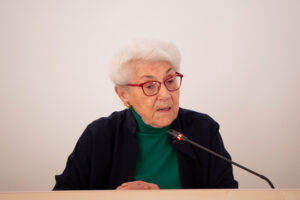 “The thing that upset me the most was the fact that the grandmothers no longer spoiled me and were no longer as joyful as before, they had become very serious, they cried. They taught me how to iron and clean the house when I was five years old. They explained to me that times had changed and that I had to learn how to do everything”. It was only years later that Lea discovered that Jewish girls, in order to escape arrest or persecution, could be sent to Britain to work as maids for wealthy families. In reality when this happened, many of them never returned to Italy or had a fate far less fortunate than they could have hoped for.
“The thing that upset me the most was the fact that the grandmothers no longer spoiled me and were no longer as joyful as before, they had become very serious, they cried. They taught me how to iron and clean the house when I was five years old. They explained to me that times had changed and that I had to learn how to do everything”. It was only years later that Lea discovered that Jewish girls, in order to escape arrest or persecution, could be sent to Britain to work as maids for wealthy families. In reality when this happened, many of them never returned to Italy or had a fate far less fortunate than they could have hoped for.
Despite the hard times that the Polgar family, like so many other Jewish families, faced at the time, they also knew solidarity and justice. “We were saved thanks to the generosity of many people, educated, ignorant, rich and poor. Many knew we were hiding and kept silent at the cost of their own lives. An awareness that Ms Lea repeats several times and for which she is very grateful. Even a family friend, Giovanni Perna, a bank official, warns the Polgar family that they would soon be deporting Jews. So Perna procures false documents for all the family members and finds them a hiding place.
“That was how we changed identities and one day we separated. I was 10 years old, grandmother gave me a bag, made by sacrificing one of her leather gloves. Inside was some precious stones to sell in case I needed money and food. They took me to Aurelio Mistruzzi’s house. Aurelio and his wife Melania, he from Friuli, a sculptor and engraver for the Vatican, she a Viennese Jew, opened the doors of their Roman home to Lea, to hide her. “I couldn’t even look out of the windows, I had to walk slowly, make no noise and hide when they beckoned me”. Mr and Mrs Mistruzzi were included in the list of the Righteous Among the Nations.
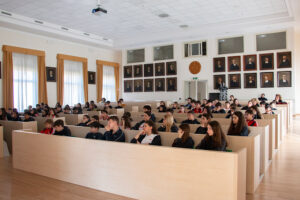 “He and his wife were two extraordinary people; they hid me and were like two parents to me […]. Then one day mum came to get me, in November, 1943, because they had denounced the rest of my family who were hiding elsewhere. People got rich by denouncing Jews, with 5,000 lire you could buy a house’. The Polgar family still managed to escape deportation because their friend Giovanni Perna sent them to another flat in a building where they could count on the complicity of the doorman. From here Lea was still hidden in a nuns’ boarding school, near which there was a German command post, “the soldiers came to mass on Sundays, so I had learnt to recite all the Catholic prayers. I even made my First Communion and Confirmation!”. Life at boarding school was difficult, Lea despaired at night, thinking she would never find her family again. Meanwhile, the Germans begin to beat a retreat.
“He and his wife were two extraordinary people; they hid me and were like two parents to me […]. Then one day mum came to get me, in November, 1943, because they had denounced the rest of my family who were hiding elsewhere. People got rich by denouncing Jews, with 5,000 lire you could buy a house’. The Polgar family still managed to escape deportation because their friend Giovanni Perna sent them to another flat in a building where they could count on the complicity of the doorman. From here Lea was still hidden in a nuns’ boarding school, near which there was a German command post, “the soldiers came to mass on Sundays, so I had learnt to recite all the Catholic prayers. I even made my First Communion and Confirmation!”. Life at boarding school was difficult, Lea despaired at night, thinking she would never find her family again. Meanwhile, the Germans begin to beat a retreat.
The moment of liberation finally arrived, on 4 and 5 June 1944. American troops entered Rome and liberated the city. The Polgar family reunited, they were all alive: ‘Dad told us that we were now free Italians. My father reopened the studio, he had his revenge’.
“The part of the family that remained in Fiume instead,” Lea gets moved, “was deported: they were all killed in Auschwitz. Lea only discovered this a few years ago.
At the end of the story, the young people present were invited to ask questions and interact with Lea. A river of questions, emotion, curiosity, of lucky teenagers who have not known such a merciless and unjust era. “Be grateful,” she repeated several times, “recover the feeling of gratitude towards life and your neighbour. Only in this way can you build a better world’.
